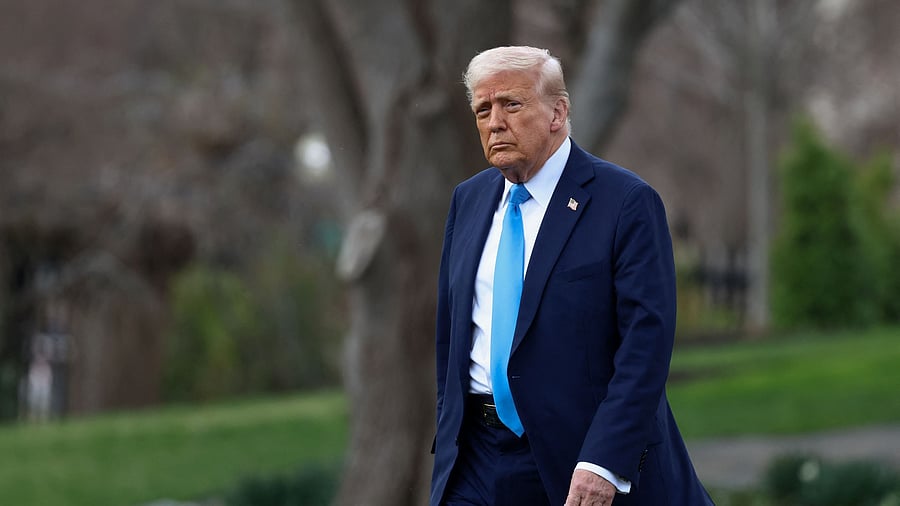
US President Donald Trump
Credit: Reuters File Photo
Over the past 40 days, the Trump administration has sledgehammered longstanding trading partnerships, leaving a trail of economic disruption in its wake. Canada and Mexico, Washington’s immediate neighbours and free trade partners, have already borne the brunt of unpredictable, unilateral tariffs. Canada has retaliated with tit-for-tat measures, targeting American goods and filing multiple trade disputes at the World Trade Organization (WTO). One notable case challenges the US’ controversial 25% tariffs on steel and aluminium, imposed on March 13.
Beyond North America, China has slapped retaliatory tariffs on US goods, citing President Trump’s untrustworthy actions on the global trade front. The European Union, another major US trading partner, has announced a series of dollar-for-dollar tariffs set to take effect on April 1. This move comes just one day before Trump’s much-publicised reciprocal tariffs against several trading partners, including India, are set to be announced on April 2.
Amid the global pushback against Trump’s tariffs, one country stands out as an outlier: India. While other nations rally to defend their economic interests, India appears to be pursuing a “trusted partnership” with Washington, despite the Trump administration’s humiliating remarks targeting the nation of 1.4 billion people. It has enabled its telecom giants AirTel and Geo to sign up Starlink satellite internet services. Earlier, the two Indian companies opposed Starlink, but at the behest of the government, they tied up with Musk’s company.
This approach seems to align with Prime Minister Narendra Modi’s transactional foreign and trade policies. India’s foreign minister has reportedly expressed approval for the “transactionalism” embedded in this survival-of-the-fittest scenario. However, it remains unclear whether such a strategy can yield equitable gains between two vastly unequal partners, especially given structural disparities and historical imbalances.
Ironically, this “trusted partnership” is unfolding between two of the world’s largest democracies. Proponents argue it could create a robust framework to achieve a $500 billion trade goal within the next six to eight months. Commerce and Industry Minister Piyush Goyal has urged India’s export promotion councils to shed their “protectionist mindset” and embrace a bold, confident approach to global trade.
Yet, Goyal’s optimistic rhetoric rings hollow in the face of criticism from the Trump administration. After Trump’s infamous accusation that India is “hiding its tariffs,” it is time for New Delhi to step out of the aggressor’s shadow and prioritise national interests.
Despite the Modi government’s attempts to spin the narrative, the reality is stark. Micro, small, and medium enterprises (MSMEs) across sectors – from auto parts to generic pharmaceuticals – are sounding the alarm. They fear that drastic tariff reductions could devastate their industries, leaving them unable to compete.
The Trump administration’s 25% tariffs on steel and aluminium, effective since March 12, have already hit Indian exporters hard. Even before formal negotiations began, New Delhi started lowering tariffs on several products, including bourbon whiskey. The critical question now is how much more India will concede in the agriculture sector, which sustains nearly 800 million people, compared to a few million heavily subsidised American farmers.
A bilateral trade agreement with the US could inflict irreparable damage on India’s vast agricultural sector. Washington has consistently opposed India’s farm policies. At the WTO, the US has repeatedly blocked a permanent solution for India’s public stockholding programmes. Additionally, India faces constant harassment through US counter-notifications on rice and other agricultural products, accusing New Delhi of breaching the 10% de minimis subsidy limit.
India’s misplaced optimism
The European Union’s decision to impose retaliatory tariffs on American goods, including bourbon whiskey, drew Trump’s ire on March 13. He threatened to slap a 200% tariff on all wines and spirits from EU member countries if Brussels refused to lower tariffs on American whiskey.
Against this backdrop, Piyush Goyal’s upcoming visit to Washington for a second round of talks raises concerns. With negotiations shrouded in opacity and punctuated only by belittling comments from Trump, the discussions seem to lack transparency and fairness. India’s self-perception as a leader of the Global South is increasingly at odds with its inability to stand up to US pressure.
In the face of what many see as neo-imperialism – a push to annex critical raw materials and resources – India appears to be siding with Trump rather than rallying developing nations for mutual benefit. This approach requires a significant shift: toughening up against Pax Americana. Sadly, New Delhi seems more focused on celebrating its attempts to forge a “trusted partnership” with the very power that undermines its interests.
The time has come for India to reassess its strategy, prioritise its economic sovereignty, and stand firm against unfair trade practices. Only then can it truly safeguard the interests of its people and industries.
(The writer is a senior journalist based in Geneva)